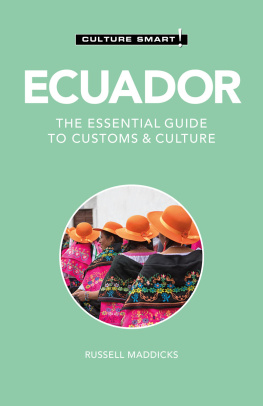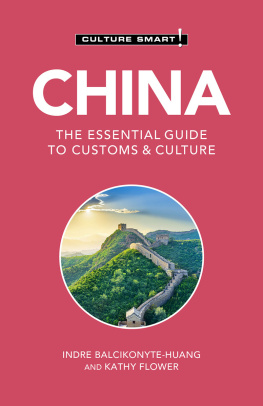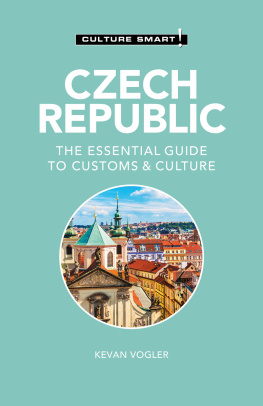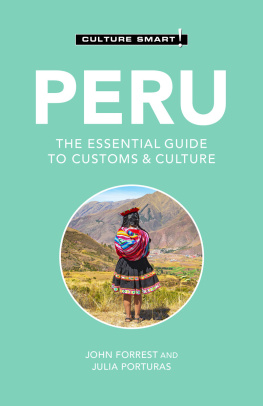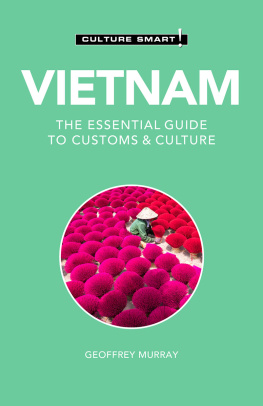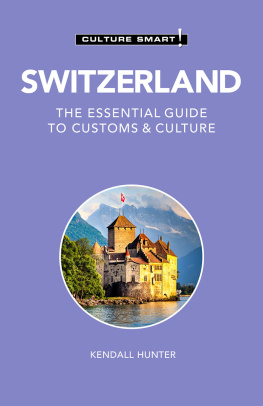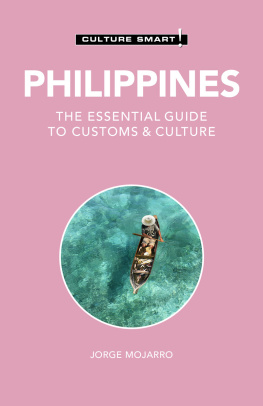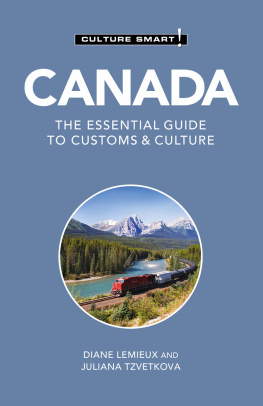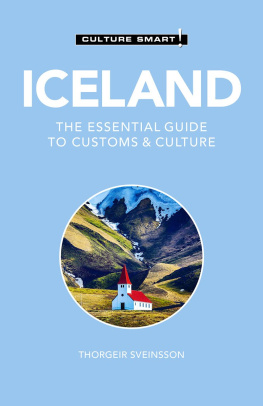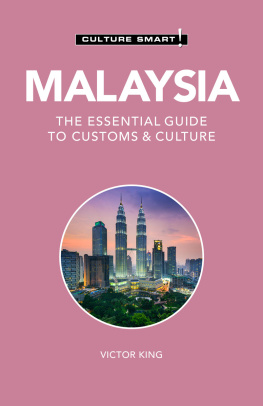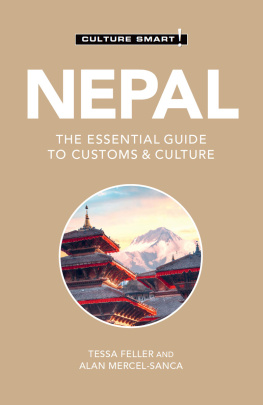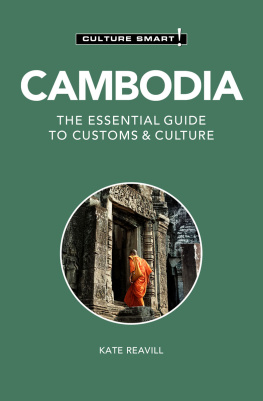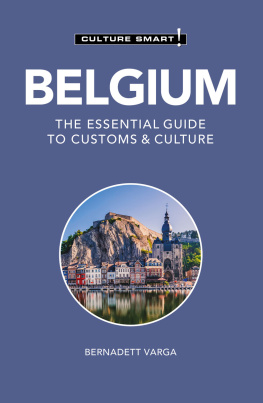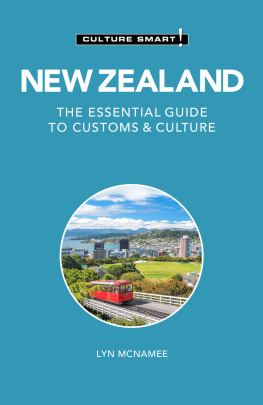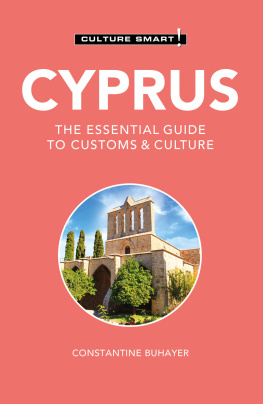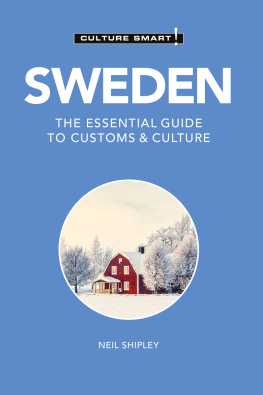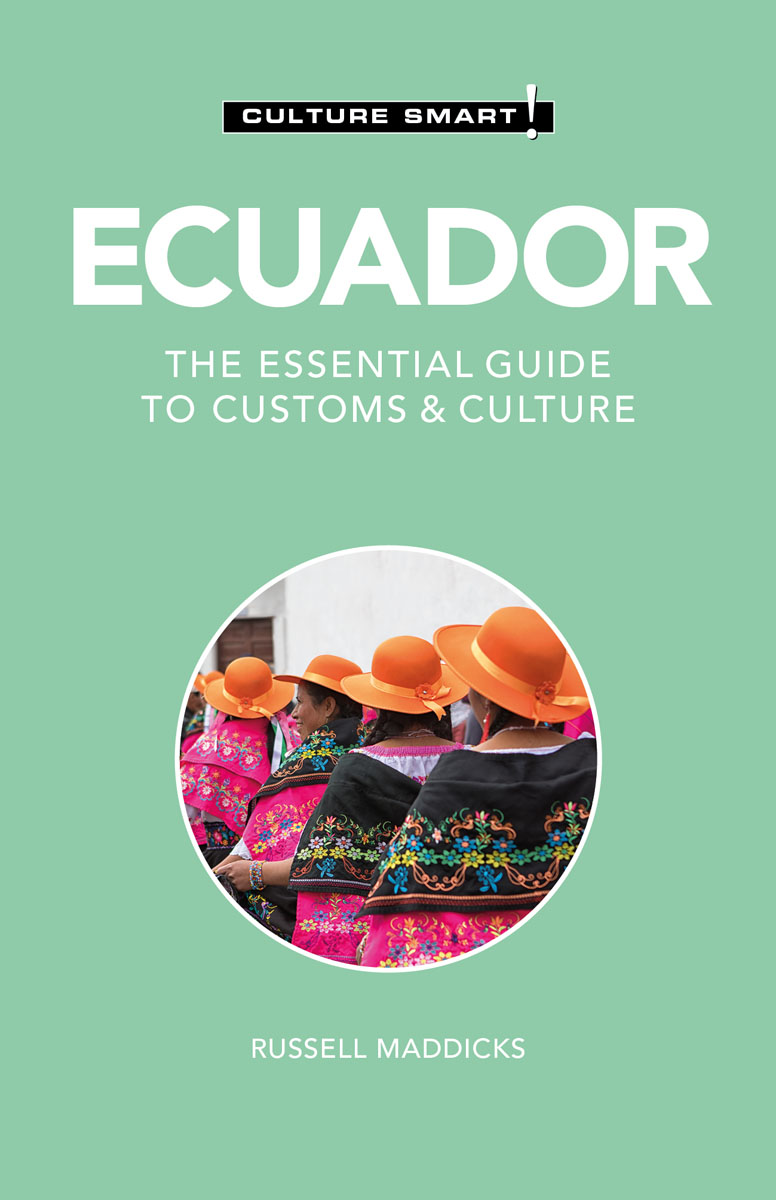
The real voyage of discovery consists not in seeking new landscapes, but in having new eyes.
Adapted from Marcel Proust, Remembrance of Things Past.
ISBN 978 1 78702 300 0
British Library Cataloguing in Publication Data
A CIP catalogue entry for this book is available
from the British Library
First published in Great Britain
by Kuperard, an imprint of Bravo Ltd
59 Hutton Grove, London N12 8DS
Tel: +44 (0) 20 8446 2440
www.culturesmart.co.uk
Inquiries:
Design Bobby Birchall
Printed in Turkey
The Culture Smart! series is continuing to expand. All Culture Smart! guides are available as e-books, and many as audio books. For further information and latest titles visit www.culturesmart.co.uk
ABOUT THE AUTHOR
RUSSELL MADDICKS is a BBC-trained writer, translator, and journalist. A graduate in Economic and Social History from the University of Hull, England, he has spent the last twenty-five years traveling, living, and working in Central and South America, and worked as a Latin American Regional Specialist for BBC Monitoring. A fluent Spanish speaker, he has made many extended trips to Ecuador, one of his favorite South American destinations, where he has explored the length and breadth of the country both for work and for pleasure. He is also the author of Culture Smart! guides to Cuba, Mexico, Nicaragua, and Venezuela and the Bradt Guide to Venezuela.
CONTENTS
MAP OF ECUADOR

INTRODUCTION
Ecuador may be the fourth-smallest country in South America, but this compact Andean nation punches above its weight in terms of diversity, with a geographical landscape so varied it has been called a microcosm of every micro-climate found in South America.
Squeezed between Colombia and Peru, Ecuador is named for its location on the Equator. It has some of the highest and most active volcanoes in the world; steamy Amazon jungles in the east; a Pacific coast dotted with beach resorts; and, out to sea, the jewel in the countrys crownthe fabled Galpagos Islands. Named after giant tortoises that can live for more than 150 years, the Galpagos is where a young Charles Darwin first had the seed of an idea that germinated into the Theory of Natural Selection and Evolution. All this diversity makes Ecuador a magnet for tourists, birdwatchers, mountain trekkers, volunteers, and US retirees looking for a warm, culturally interesting, affordable, and safe place to spend their retirement dollars.
A food lovers dream, the countrys cuisine is as diverse as its geography, with village markets offering traditional country-style comfort food, seafood stalls on the beaches of the Pacific serving up delicious ceviches, and gourmet restaurants delivering exquisite fine dining in the cities of Quito, Cuenca, and Guayaquil. Scientists have now firmly established that Ecuadornot Mexicois the true birthplace of chocolate and that cacao cultivation first began 5,000 years ago in the Amazonian area of Zamora-Chinchipe. So it is no surprise that its premium Arriba cocoa beans are highly coveted by the worlds chocolate makers.
Ecuadorians are proud, friendly, hospitable, and hardworking. The countrys diverse population reflects a unique blend of cultures, from the traditionally dressed villagers of the Sierra mountains, to the tribal peoples of the Amazonian rainforest, and AfroEcuadorians in Esmeraldas and the Chota Valley. To understand the culture in any depth, however, you need to know the complex historical divisions between the highlands and the coast, and the rigid class and racial hierarchy that has dominated the countrys history.
In recent years, the far-reaching economic and social progress won under former President Rafael Correa has faltered, while the effects of the coronavirus pandemic exacerbated an economic downturn by halting one of the countrys leading sources of incometourism. There is optimism for the future, however; travelers are returning to Ecuador once more and there is a feeling of anticipation as the country finds its footing under new political leadership.
This updated edition of Culture Smart! Ecuador takes you to the heart of this diverse nation to give you an insiders view of the people, their history, and their way of life. It describes the customs and traditions that people hold dear and the attitudes that you are most likely to encounter. Once the ice has been broken, Ecuadorians are fun-loving and extremely sociable. Any effort made to get to know them will be welcomed and reciprocated many times over.
KEY FACTS
Official Name | Repblica de Ecuador | Pop. 18 million |
Capital City | Quito | Pop. 2 million. Altitude 9,350 ft (2,850 m) |
Other Major Cities | Guayaquil (pop. 2.6m); Cuenca (330,000); Santo Domingo (322,000) |
Area | 99,706 sq. miles (258,238 sq. km) | Fourth-smallest country in South America |
Geography | Borders Colombia in the north, Peru in the south and east, and Pacific coast on the west. Straddles the Equator in northwest and includes part of Amazon basin |
Terrain | Diverse. Mountains, snow-covered volcanoes, cloud forests; tropical rainforests, major river systems, coastal lowlands, beaches, islands |
Climate | Coast dry and hot with rainy season downpours; rain forest hot, wet, humid; mountains cool, temperate | Quito temperatures spring-like year-round. Average high of 67F (19.5C) and low of 48.5F (9C) |
Seasons | Dry and rainy seasons vary with altitude. Dry months Sep.Nov. on coast; Jun.Oct. in highlands; Nov.Mar. in the Amazon | Sunrise ( 6:00 a.m.) and sunset ( 6:00 p.m.) throughout the year. |
Life Expectancy | Men 74; women 79 |
Ethnic makeup | 71.9% Mestizo (mixed race); 7.4% Montubio; 7.2% AfroEcuadorian; 7% Indigenous; 6.1% White |
Languages | Official language: Spanish 92.83%. 12 indigenous languages | Quechua and Shuar recognized as Official Languages of Intercultural Relations in 2008 Constitution. |
Religion | 76% Roman Catholic; 15% Protestant/Evangelical; 1.5% Jehovahs Witness; 7% indigenous beliefs/other | Protestants have made significant gains in recent years. |
Government | Democratic Republic with a Unicameral National Assembly elected every four years. President is chief of state and head of government, elected every four years. | Country divided into 24 provinces, each with an administrative capital |
Media | Privately owned national newspapers: El Comercio, El Universal, Hoy |
Currency | US dollar (US$), divided into 100 cents | GDP per capita US $5,600 |
Electricity |

